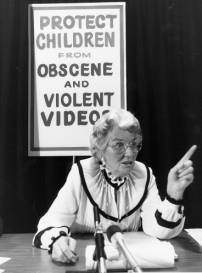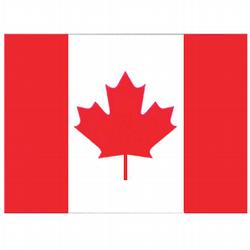 An obscene lack of supporters
An obscene lack of supporters
From
The Guardian Well worthwhile reading full article by James Silver
Mary
Whitehouse packed halls and hogged the airwaves, so why is her successor finding it very difficult to lobby support when a similar group in the US is hugely popular?
In its heyday, Whitehouse's NVALA had 150,000 members (including affiliated
groups), as well as a broad public profile. However, today, the organisation, renamed mediawatch-UK after her death in 2001, is a shadow of itself, with just 5,000 on its books. Her successor, John Beyer, who is softly-spoken and unassuming, concedes the
Herculean nature of the task he faces. [Membership] has gone down, but we are taking steps to reverse the trend. Next month we're taking on an extra member of staff to go around the country to promote mediawatch-UK and find new members. But it's an
uphill struggle.
The presence of Whitehouse, he acknowledges, still looms large. Mary was very good at getting headlines and I'm aware of the fact that I'm not, he says ruefully. She had the ear of Mrs Thatcher, when she was prime
minister, there's no doubt about that. When I write to Tony Blair, John Reid or Tessa Jowell I don't even get replies.
Nevertheless, on the other side of the Atlantic, the Parents Television Council (PTC),
which shares many of mediawatch-UK's values and goals, boasts a powerful public profile. While it is true that with one million members, the far better resourced PTC is a leviathan when compared with Beyer's rag-tag Kent-based army, its campaigning
tactics centre on two things; keeping its message simple and its focus on mainstream TV (as opposed to the media as a whole). The PTC also confronts advertisers over TV which it considers beyond the pale.
There are a number of different facets
to what we do but advertiser campaigns are a major part, explains its director of corporate and government affairs, Dan Issett: Advertisers are the ones who buy the ads and actually pay for much of the programming. These corporations have written
codes of corporate conduct and often some of the graphic and explicit content in TV shows runs contrary to their codes. A lot of the time it's simply a matter of making them aware of the content they are actually sponsoring and encouraging them to adhere
to their published standards. We also maintain a pretty high profile in terms of media exposure, we run letter-writing campaigns and pursue other forms of contact with policy-makers. But all we really do is tap into the frustration of the American people
with the state of the entertainment industry in general and TV in particular.
The PTC can count on an American public broadly sympathetic to its message. In Britain, on the other hand, says Professor
Steven Barnett, professor of communications at Westminster university, values have changed dramatically in recent decades, as has the media landscape.
He says: Whitehouse was brilliant at capturing a mood. But that mood has changed. Britain is
a more tolerant, less censorious place. Beyer would have a much stronger constituency in America. If a tit pops out on primetime over there the country goes berserk. We left that behind 30 years ago. For that reason Beyer's organisation doesn't really
have much of a constituency any more.
 Nutters scupper art exhibition
Nutters scupper art exhibition  Obscenity investigation into The Da Vinci Code quickly dropped
Obscenity investigation into The Da Vinci Code quickly dropped  The Vatican should realise by now the harm that can be caused by sexual denial
The Vatican should realise by now the harm that can be caused by sexual denial  Call to ban vibrating condom rings in Madhya Pradesh
Call to ban vibrating condom rings in Madhya Pradesh  'Cleric' calls for murder of magazine editor
'Cleric' calls for murder of magazine editor 
 Buddha images on underwear offend Thailand
Buddha images on underwear offend Thailand  Nutters complain about airline seat back TV
Nutters complain about airline seat back TV 
 New Zealand catholics bring case against South Park
New Zealand catholics bring case against South Park 
 Catholics whinge about Canadian TV programme
Catholics whinge about Canadian TV programme  Complaints about US TV decline
Complaints about US TV decline  Art vandalised and artist arrested
Art vandalised and artist arrested  Satellite Porn
Satellite Porn  And a protest outside of WH Smiths
And a protest outside of WH Smiths  Magazine challenged for likening god to traffic cop
Magazine challenged for likening god to traffic cop  An obscene lack of supporters
An obscene lack of supporters  Nutters call for grand jury investigation into adult businesses
Nutters call for grand jury investigation into adult businesses 